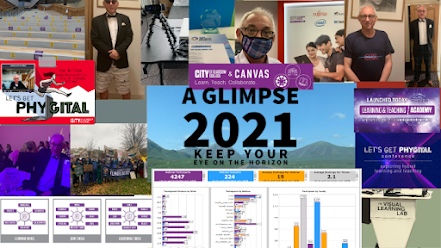This September, for the first time in thirty nine years , I am not preparing for the start of term. No staff briefings. No last-minute system tweaks. No wondering whether staff will be more engaged, more challenging, more everything - and what budget cuts are coming down the line etc and mainly wondering if the students will cope and will staff actually step them through induction or leave them to sink or swim.
As I push on I am bringing opportunities back to the College sector and the folks I know will be receptive to new ideas.
Time to for a quick reflection on what I said I would do and what I've actually achieved and what I have to catch up on - I am due a post both on ALT Scotland SIG meeting at end of June and on #OER25 which I keynoted at before heading off on leave. That will be my next tasks.
When I said my farewells I promised I would keep pushing on a number of fronts. Here is a potted update and a report card.
- UNESCO - Continue shaping bid for project around better understanding of the open source code available for creation and management of Open Badges in support of Micro credentials. Bid completed and I anticipate publication appearing before Christmas. This from work in Bilbao
- Continue work with UK Digital Badging Commission - input completed and work now published. Tied in well with UNESCO work and my fellowship with RSA. Led to some comms and work with 1Edtech. Scottish education seems miles away from adopting these approaches.
- Hopefully continue to support work of QAA around Scottish Tertiary Quality framework. Delighted to say I now have a part-time role as a Quality Assurance Specialist for QAA.
- Champion Teachermatic and other AI approaches to changing learning paradigm. This is still work in progress have delivered a number of sessions and keynotes.
- Champion Canvas by Instructure . I am still due to do a bigger deeper blog on Canvas and why it should be platform of choice. But enjoyed working with Martin Bean in Scotland and enjoyed my time in Barcelona at #CanvasCon
- Continue to support Open Scotland following Dubai Summit to encourage more Open practice in Scotland. I keynoted #oer25 in London in June ( post to follow) I've presented to Once for Scotland to see if we can re-engage policy makers across Scotland and hoping to pick up conversation with Lee Dunn in the current administration. I am presenting OERGlobal25 in November.
- Encourage better understanding of Adaptive Comparative Judgement - this probably one area where I haven't really pushed on.
- Offer informed input on shape and future of tertiary sector in Scotland. I keep knocking on relevant doors. There really needs to be a wholesale change in approach.
- Continue as Chair of Association of Learning Technology special interest group in Scotland and do a bit more community building for ALT. Held two meetings this year. Summary of online conference April - report on June Stirling Conference to come and I am co-chair of UK ALTC Conference coming to Glasgow for first time in October.
- Continue to offer support to suppliers , institutions and staff who want to digitally transform their practice and the experience of learners. Some notable successes with Smart Technologies really down to quality of product and support available in Scotland and in dialogue with a number of other suppliers. I continue to work with lots of old friends from @Bett Conferences and my network.
- I've run a couple of College sessions but sector could do with a few more - still not really seeing blended learning to the fore. I think I could do more on that front. (if anyone wants a short workshop on digital transformation for managers or teaching staff - please just reach out)
- FRSA - Support Glasgow branch around organising a series of events this and next year. Making progress civic reception at City Chambers and event at Citizens Theatre in planning - reaching out to Education contacts for RSA.
- Continue as Chair of IWasGonnae and Old Hall Scout Group. - both organisations thriving - really down to the energy and skills of the teams there.






